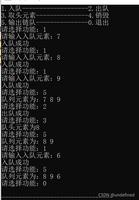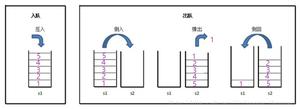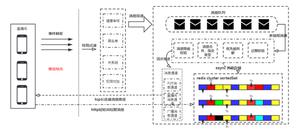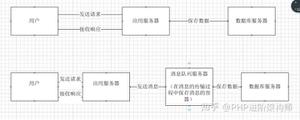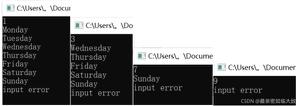C++ 中消息队列函数实例详解
1.消息队列结构体的定义
typedef struct{
uid_t uid; /* owner`s user id */
gid_t gid; /* owner`s group id */
udi_t cuid; /* creator`s user id */
gid_t cgid; /* creator`s group id */
mode_t mode; /* read-write permissions 0400 MSG_R 0200 MSG_W*/
ulong_t seq; /* slot usage sequence number*/
}ipc_perm;
typedef stuct{
struct ipc_perm msg_perm; /* read_write perms */
struct msg *msg_first; /* ptr to first message on queue */
struct msg *msg_last; /* ptr to last message on queue */
msglen_t msg_cbytes; /* used bytes current on queue */
msgqnum_t msg_qnum; /* current num of message on queue */
msglen_t msg_qbytes; /* max # of bytes allowed on queue */
pid_t msg_lspid; /* pid of last msgsnd() */
pid_t msg_lrpid; /* pid of last msgrcv() */
time_t msg_stime; /* time of last msgsnd() */
time_t msg_rtime; /* time of last msgrcv() */
time_t msg_ctime; /* time of last msgctl() */
}msqid_ds;
typedef struct
{
long mtype;
char mbuf[MSGLEN];
}Message;
2.创建消息队列:
/***************************************************
Function:
int msgget(ket_t key,int oflag);
Explain:
create or view a message queue
Return :
a int indetify
Include:
sys/msg.h
introduction:
oflag: 0400 msg_r
0200 msg_w
0600 msg_wr
ipc_creat: NO exist and then creat a queue
exist : reference a queue
ipc_creat|ipc_excl: NO exist and then creat a queue
exist : return error
****************************************************/
#include<stdio.h>
#include<sys/msg.h>
#include<stdlib.h>
int MsgGet(int key)
{
int ret;
ret=msgget(key,0600|IPC_CREAT);
// ret=msgget(key,0600|IPC_CREAT|IPC_EXCL);
if(ret<0)
perror("creat msgid error");
printf("msgid=%d/n",ret);
system("ipcs -q -i ret");
return ret;
}
int main(int argc,char *agrv[])
{
int key;
printf("pleasse input msgkey:");
scanf("%d",&key);
MsgGet(key);
return 0;
}
3.向消息队列中发送消息msgsnd
/***********************************************************************************
Function:
int msgsnd(int msqid,const void *ptr,size_t length,int flag)
Explain:
send a message to a queue
Return:
len: send message len;
Include:
sys/msg.h
Introduction:
flag: 0 : if queue full wait:1>具备存放新消息的空间
2>由msqid标识的消息队列从系统中删除(返回EIDRM错误)
3>调用线程被某个捕获的信号所中断(返回EINTR错误)
IPC_NOWAIT:如果没有存放新消息的空间,函数马上返回
1>指定的队列中有太多的字节
2>在系统范围存在太多的消息
*****************************************************************************************/
#include "typemsg.h"
int MsgSnd(int msqid,char *buf,int len,int flag)
{
int ret;
ret=msgsnd(msqid,buf,len,flag);
if(ret<0)
perror("msgsnd error");
system("ipcs -q");
return ret;
}
int main()
{
int msqid,len,stype;
Message msgb;
memset(&msgb,0,sizeof(Message));
printf("msgsnd:please input msqid:");
scanf("%d",&msqid);
printf("please input msgtype:");
scanf("%d",&stype);
msgb.mtype=stype;
strcpy(msgb.mbuf,"zhangweia");
MsgSnd(msqid,(char *)&msgb,sizeof(Message),0);
return 0;
}
4.从队列中获取消息 msgrcv
/*********************************************************************
Function:
int msgrcv(int msqid,const void *ptr,size_t msglen,long type,int flag)
Explain:
recv message order by type
msgrcv error: Argument list too long --> msglen的长度小于消息体中消息的长度
Para :
ptr: point to message struct
msglen: 由ptr指向的缓冲区中数据部分的大小,这个是该函数能够返回的最大数据量
type: message type;
1> 0:返回队列中最早的消息
2> 大于0:返回消息队列中类型为type的第一个消息
3> 小于0:返回消息队列中类型小于或者等于type的绝对值的消息类型中最小的第一个消息
flag: 0<wait> 没有消息或者消息类型不符合的时候,线程等待
响应: 1>有一个所请求类型的消息可以获取
2>msqid的消息队列被系统删除,返回一个EIDRM
3>调用线程被某个捕获的信号所中断
IPC_NOWAIT:在没有数据的情况下,立即返回一个ENOMSG错误
MSGNOERROR:当所接受的消息数据部分大于msglen长度时,获取截短的数据部分,否则返回E2BIG错误
Return:
message len
*********************************************************************/
#include "typemsg.h"
int MsgRcv(int msqid,char *buf,int msglen,long type,int flag)
{
int ret;
ret=msgrcv(msqid,buf,msglen,type,flag);
if(ret<0)
perror("msgrcv error");
system("ipcs -q");
return ret;
}
int main()
{
int msqid,len;
long ttype;
Message mbuf;
printf("msgrcv:please input recv msqid:");
scanf("%d",&msqid);
MsgRcv(msqid,(char *)&mbuf,8900,0,IPC_NOWAIT);
printf("recv message=%s/n",mbuf.mbuf);
Put_String((unsigned char *)&mbuf,sizeof(Message));
return 0;
}
6.消息队列的控制msgctl
/**********************************************************
Function:
int msgctl(int msqid,int cmd,struct msqid_ds *buff)
Explain:
cdm: IPC_RMID; delete msqid
IPC_SET:
IPC_STAT: return msqid stat
*********************************************************/
#include "typemsg.h"
int MsgCtl(int msqid,int cmd,struct msqid_ds *buff)
{
int ret;
ret=msgctl(msqid,cmd,buff);
if(ret<0)
{
perror("msgctl error");
return -1;
}
return 0;
}
int main()
{
int msqid,type;
struct msqid_ds info;
printf("please input msqid /nand type(1:icp_rmid;2:ipc_stat)");
scanf("%d%d",&msqid,&type);
if(type==1)
{
MsgCtl(msqid,IPC_RMID,NULL);
printf("delete queue success:%d/n",msqid);
}else if(type==2)
{
MsgCtl(msqid,IPC_STAT,&info);
printf("get queue stat:%d/n",msqid);
}
return 0;
}
感谢阅读,希望能帮助到大家,谢谢大家对本站的支持!
以上是 C++ 中消息队列函数实例详解 的全部内容, 来源链接: utcz.com/z/319697.html

